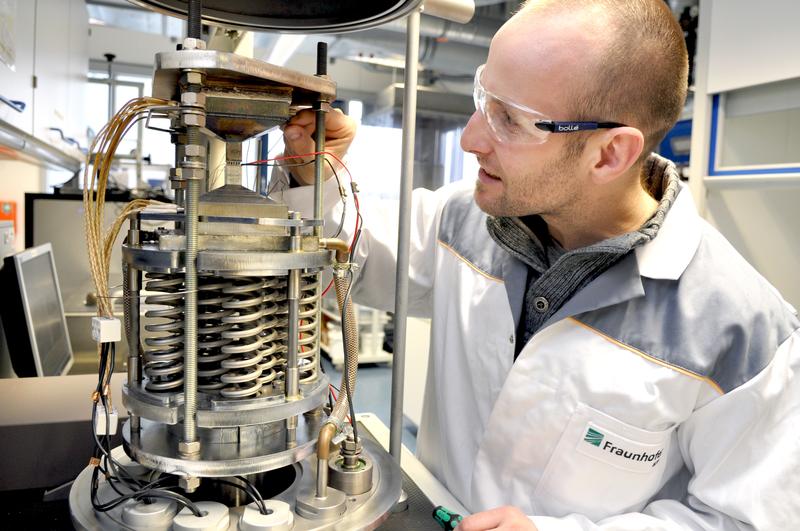

Test stand for efficient and autonomous power generation of the waste heat of an all-ceramic heating conductor working at 800 °C in ceramic TEG modules.
Fraunhofer IKTS
Currently, less than half of the energy used in industrial processes, transport or households is actually utilized. The majority of primary energy still escapes despite numerous energy-saving measures as waste heat into the environment.
Thermoelectric generators (TEG) can help to transform this wasted heat energy into electricity. However, there are still obstacles in terms of cost efficiency, availability of raw materials, processing and environmental sustainability of the applied thermoelectric materials.
Ceramic materials provide a solution with an exceptionally flexible property range. They can be produced environmentally friendly from readily available raw materials. Up to now, ceramic TEGs for only limited tasks and low energy conversion efficiency were realized.
Fraunhofer IKTS has extensive know-how regarding the production of ceramic thermoelectric materials. As the first German research institute, IKTS managed the cost-effective production of fully functional ceramic TEGs that have a long lifetime and can be used at high temperatures, which makes them energetically interesting.
“We offer our customers economically attractive ceramic TEG modules, with which valuable waste heat can be converted into electricity independently and reliably – and at temperatures of up to 1000 °C. Such robust, maintenance-free and particularly durable TEGs are attractive for a variety of applications, e.g. in metallurgical processes, or in the hot zones of internal combustion engines.” says Hans-Peter Martin, head of the group “Nitride Ceramics and Structural Ceramics with Electrical Function” at Fraunhofer IKTS.
Scientists at the Fraunhofer IKTS offer a customized development of ceramic TEG modules – adapted for the conditions of the host process. Therefore, the ceramic components are optimized in terms of electrical parameters, chemical interactions and geometrical requirements, and – on request – integrated into the individual thermal system. With the system configuration shown in Hannover, visitors can experience firsthand how the waste heat of a working all-ceramic heating conductor at 800 °C is converted in the ceramic TEG modules and used for controlling a display.
The expertise to build such TEGs at Fraunhofer IKTS is derived from the institute’s decades of experience with electrically functionalized high-temperature materials, such as heat conductors, evaporators and ceramic foams. Guests and partners can also inform themselves about these technology offers at the Hannover Messe 2016.
http://www.ikts.fraunhofer.de/en/pressandmedia/pressemitteilungen/teg.html












